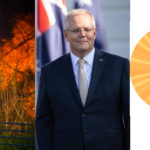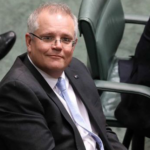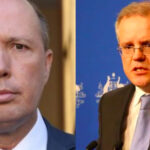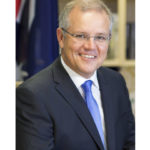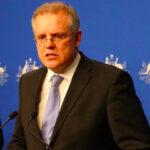History Will Condemn the Heartless Morrison Regime
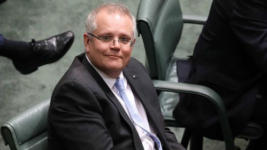
Sitting on a table in prime minister Scott Morrison’s office is a metal trophy in the shape of an asylum seeker boat, with a statement proudly printed on its side, which reads, “I Stopped These.”
It speaks of a white man privileged as a result of 500 years of European colonisation, bragging about an achievement steeped in the misery of poor people of colour, denying them the rights bestowed within the international refugee convention to which Australia has long been a party to.
The PM could just have easily ordered a model of an offshore detention centre, which boasted, “I Lorded It Over This Atrocity”. As immigration minister, Morrison was a key architect of the Sovereign Borders regime, which included the imprisonment of innocent children in someone else’s country.
Or the Anglo Australian leader could make himself a medal emblazoned with the statement, “I Perpetuated the Neo-colonial System of Incarcerating Large Numbers of First Nations People, Whilst Filling the Coffers With the Profit From Minerals Extracted From Their Lands.”
Indeed, the devout man of faith is merely the latest figurehead to stand before the nation and carry further forward a project that involved over 70 years of the official White Australia Policy.
However, Morrison’s in the driver’s seat, pushing down harder on the accelerator, at a time when greater numbers of Australians, as well as global citizens, are waking up to what’s actually going on.
Incarcerating the innocent
With its coming to power in September 2013, the Liberal Nationals government implemented Operation Sovereign Borders, which is based upon the turning back of refugee boats, and the mandatory and indefinite detention of asylum seekers arriving that way.
This system of criminalising and imprisoning people who have lawfully entered Australian waters whilst fleeing persecution in their homelands has involved abuse, torture, the ongoing imprisonment of children on islands and the death of thirteen asylum seekers whilst in custody.
The last detainee to die was Fariborz Karami on Nauru in June 2018. Just a week after the Kurdish man’s suicide, home affairs minister Peter Dutton warned the “hard-won success of the last few years could be undone overnight by a single act of compassion” that involved bringing detainees here.
As of 31 July this year, there were still 361 offshore detainees on Nauru and in Papua New Guinea. And there are now around 180 former offshore detainees being held in hotels in Melbourne and Brisbane, with no allowances being made for them to protect themselves against COVID-19.
The government has just reopened the notorious Christmas Island detention centre, and has started sending detainees there, while acting immigration minister Alan Tudge has a bill before parliament, which, if passed, would allow for the confiscation of detainees’ phones, effectively silencing them.
Maintaining the gap
The number of adult First Nations inmates in Australian prisons increased by 5 percent over the first three months of this year. As of last March, there were 12,902 Aboriginal and Torres Strait Islander prisoners in this country.
This accounted for 29 percent of the total adult prisoner population, while First Nations people only make up less than 3 percent of the overall populace.
Meanwhile, the 2020 Productivity Commission report outlines that over 2018-19, the daily average incarceration rate of First Nations kids between 10 and 17 was 466, which accounted for 58 percent of those inside. However, Indigenous youths only make up 5 percent of the general populace.
The recent upsurge in the Black Lives Matter movement has drawn attention to this overrepresentation in prisons, along with numerous other injustices, including ongoing Aboriginal deaths in custody, and police brutality towards First Nations people.
Yet, the response from the Morrison government has been weak. In its reworked Closing the Gap, it incorporated justice targets that set goals to lower the percent of First Nations adult inmates by 15 percent by 2031 and the number of young prisoners by 30 percent that same year.
NATSILS deemed these targets unacceptable. It pointed out that the adult target wouldn’t result in parity until 2093, while, if the age of criminal responsibility had been lifted from 10 to 14 that same week, the number of Indigenous youths locked up would have instantly dropped by 17 percent.
The creeping surveillance state
The Morrison government oversaw the 2019 AFP press raids on journalists, it is moving to prosecute whistleblowers Bernard Collaery and David McBride in closed courts and it’s continued to roll out counterterrorism laws that eat away at the rights of all Australians.
This tightening of control over the general populace has been an ongoing bipartisan project of successive Australian governments, which has seen at least 85 civil liberties eroding pieces of counterterrorism legislation passed at the federal level since 9/11.
Under the tutelage of Scomo, we’ve seen the passing of laws that allow for defence force personnel to be called out with ease to deal with civil situations, as well as laws that provide government with a legal process to get behind encrypted walls to peruse citizens’ private data.
And earlier this month, the PM and the home affairs minister launched the 2020 Australian Cyber Security Strategy. The details are still sketchy, but it will see a broadening of federal police powers and it will permit the Australian Signals Directorate to commence spying domestically.
Corporate-government rule
One of the gravest crimes of the Morrison regime is its enhancement of the fossil fuel industry at a time when not only is the understanding of the climate crisis rising, but the country became ground zero of the emergency as 20 percent of mainland forest burnt to a crisp last summer.
And as the final flames of the unprecedented bushfires were still alight, Morrison appointed a new resources minister Keith Pitt, who announced that he envisioned the way forward for the nation was to invest in further coal, gas and uranium.
The prime minister then established the National COVID-19 Coordination Commission (NCCC) on 25 March. It’s an advisory board made up of corporate executives charged with developing the post-pandemic economic recovery.
A NCCC document leaked to the press in May revealed it’s devised a recovery driven by gas, which is just as harmful to the environment as coal. And further, as the PM last month rebranded the body the NCC, he also embedded it in government, thus marking a new era of corporate-government rule.
How good is bastardry
History will not smile favourably upon prime minister Scott Morrison and his cabinet. With the aid of a complicit media, a government such as his can put forward a favourable spin on dastardly deeds.
But the indefinite detention of innocent people lawfully arriving by boat are circumstances that won’t appear appropriate or humane with the passing of time.
And while it’s true Morrison’s approval rating has spiked of late, this is hardly surprising during a pandemic situation, when an insecure citizenry is looking for some showing of strong governance in any form it can get its hands on.
So, for the Morrison government to foolheartedly kick its heels and carry on down the fossil fuel lined highway without any thought of the consequences, will not be forgiven by those looking back pondering why supposedly intelligent politicians simply steered the vehicle off the cliff.


